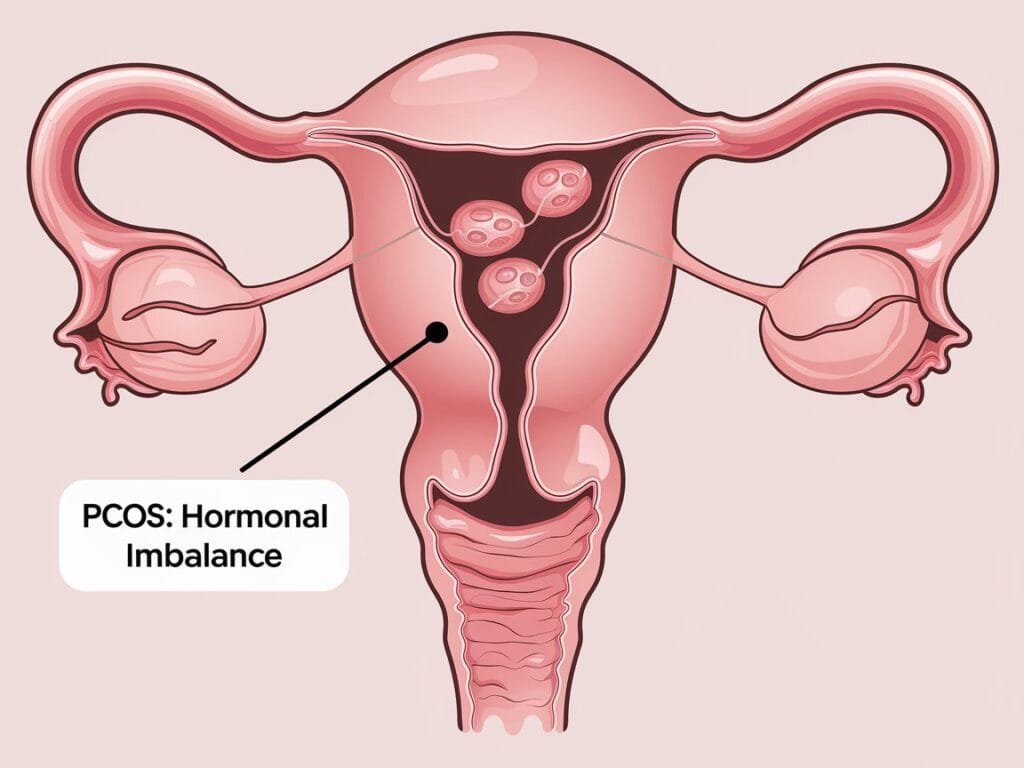Polycystic Ovary Syndrome (PCOS) is a health condition that affects many women of all ages. It can cause issues like irregular periods, weight gain, and more, but with the right information, you can better understand it. Let’s explore what PCOS is and why it’s important for every woman to know about it.
What is PCOS?
PCOS stands for Polycystic Ovary Syndrome. This happens when a woman’s ovaries produce more “male” hormones, known as androgens. When these hormones are too high, they can disrupt the menstrual cycle, cause skin issues, and affect overall health.

Symptoms of PCOS
Every woman with PCOS experiences it differently, but some common symptoms include:
- Irregular Periods: Your periods may not come regularly each month or could be very light or heavy.
- Weight Gain: PCOS can make it harder for many women to lose weight.
- Excess Hair Growth: You might notice more hair growing on your face, chest, or back, where it doesn’t typically grow.
- Oily Skin and Acne: You may have more oily skin, leading to breakouts, especially on your face, chest, and back.
- Thinning Hair: The hair on your scalp might become thinner and fall out more easily.
- Dark Skin Patches: Some women with PCOS develop darker skin on their neck, underarms, or groin area.
Remember, not all women with PCOS will have all of these symptoms, and the intensity of symptoms can vary.
What Causes PCOS?
Doctors don’t know exactly what causes PCOS, but some factors may include:
- Genetics: If someone in your family, like your mother or sister, has PCOS, you may be more likely to have it too.
- Insulin Resistance: Many women with PCOS have trouble using insulin, a hormone that controls blood sugar levels. When insulin levels are too high, it can lead to an increase in androgens, which causes symptoms of PCOS.
- Other Factors: Lifestyle and environmental factors may also play a role in developing PCOS, but more research is needed.

How is PCOS Diagnosed?
If you think you might have PCOS, visiting your doctor is an important first step. They may ask about your symptoms and do some tests to find out more. These tests could include:
- Physical Exam: A check-up for common signs of PCOS, like extra hair growth or acne.
- Blood Tests: These can measure hormone levels to see if androgens are higher than normal.
- Ultrasound: This test helps the doctor look at your ovaries to see if there are cysts or other signs of PCOS.
Why is PCOS Important to Treat?
Treating PCOS is important because it can lead to other health issues if left untreated:
- Health Problems: Women with untreated PCOS are at a higher risk of developing conditions like type 2 diabetes, heart disease, and high blood pressure.
- Fertility Issues: PCOS can make it harder to get pregnant, but with the right treatment, many women can improve their chances of having a baby.
- Daily Symptoms: Managing PCOS symptoms like acne or excess hair growth can make you feel better and improve your quality of life.
How is PCOS Treated?
There is no cure for PCOS, but several treatments can help manage the symptoms:
- Healthy Lifestyle: Eating a balanced diet and exercising regularly can help control weight, which can, in turn, help reduce symptoms of PCOS.
- Medications: Depending on your symptoms, your doctor might prescribe:
- Birth Control Pills: These help regulate your menstrual cycle and lower androgen levels.
- Metformin: This medicine helps with insulin resistance and can improve symptoms of PCOS.
- Anti-Androgens: These reduce the effect of androgens in your body, helping with symptoms like hair growth and acne.
- Personal Care: Taking care of your skin and managing hair growth can also improve how you feel about your appearance.
PCOS and Fertility
PCOS can make getting pregnant more difficult because it can affect ovulation. However, there are treatments that can help:
- Medications: Some medicines can help your body ovulate, making it easier to conceive.
- Lifestyle Changes: Eating healthy and staying active can improve your chances of getting pregnant.
- Fertility Treatments: In some cases, fertility treatments like in-vitro fertilization (IVF) might be needed.

Living with PCOS
While living with PCOS can feel challenging, there are many ways to manage it and live well:
- Stay Informed: The more you know about PCOS, the better prepared you’ll be to manage it.
- Find Support: Talk to friends and family, or join a support group. You’re not alone in this.
- Work with Your Doctor: Regular check-ups and good communication with your doctor can help you manage symptoms and stay healthy.
- Self-Care Matters: Take time to relax, manage stress, and practice self-care through activities like yoga or meditation.
Conclusion
PCOS is a common condition that affects many women. By understanding the symptoms, causes, and treatments, you can better manage PCOS and improve your quality of life. If you think you have PCOS, talk to your doctor about the best steps for your health. With the right care, knowledge, and support, you can live a healthy and fulfilling life. Remember, you’re stronger than you think!
FAQs
- What is PCOS? PCOS stands for Polycystic Ovary Syndrome. It’s a condition where a woman’s ovaries produce more male hormones, leading to issues like irregular periods and skin problems.
- Can I get pregnant if I have PCOS? Yes, while PCOS can make it harder to conceive, many women with PCOS can still get pregnant with the help of medications and a healthy lifestyle.
- What are common symptoms of PCOS? Common symptoms include irregular periods, weight gain, excess hair growth, acne, and thinning hair on the scalp.
- Is there a cure for PCOS? There is no cure, but treatments can help manage the symptoms.
- How can I manage PCOS? You can manage PCOS with a healthy lifestyle, medications, and regular check-ups with your doctor.
6. Does PCOS increase my risk of other health problems? Yes, untreated PCOS can increase the risk of type 2 diabetes, heart disease, and high blood pressure.



